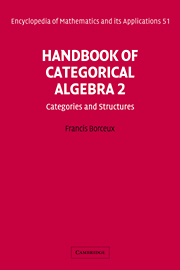Preface to volume 2
Published online by Cambridge University Press: 30 December 2009
Summary
This second volume of the Handbook of categorical algebra presents a selection of well-known specialized topics in category theory, with the exception of toposes which find their natural place in volume 3.
The first great achievement of category theory has certainly been the theory of abelian categories: these play an important role in homology and provide the correct setting for studying problems related to exact sequences. Entire books are devoted to abelian categories; in the first chapter of this volume we have selected some topics on abelian categories which appear to remain highly relevant in to-day's research in general category theory. The chapter starts by establishing the key “exactness” properties of limits and colimits in an abelian category, those properties being closely related to the existence of an “additive structure” on the sets of morphisms. The notion of exact sequence is then introduced together with the technique of “diagram chasing”, used to prove the fundamental diagram lemmas. “Diagram chasing” is a technique for proving exactness properties in an abelian category, just by proving them in the categories of modules, where actual elements can be used. This is best achieved by applying the famous “embedding theorem” which asserts that every small abelian category can be fully and exactly embedded in a category of modules. This very difficult theorem is proved at the end of the chapter, using a Lubkin completion technique which turns out to be applicable in many other categorical situations.
Information
- Type
- Chapter
- Information
- Handbook of Categorical Algebra , pp. xi - xivPublisher: Cambridge University PressPrint publication year: 1994
